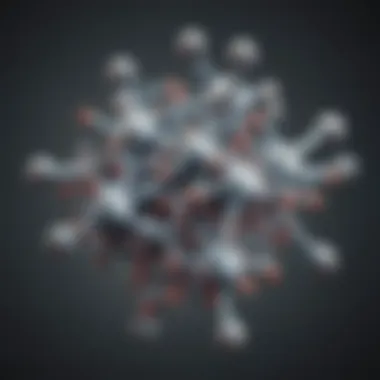SHC Glutathione: Biochemical Significance and Applications


Intro
SHC glutathione, often referred to simply as glutathione, is a tripeptide composed of three amino acids: cysteine, glutamine, and glycine. Its biochemical structure positions it uniquely as a critical molecule in cellular processes. This article will explore its functionality, health implications, and potential applications in both clinical and health contexts. Moreover, the exploration of recent advances in research will highlight its significance further.
The importance of SHC glutathione spans numerous biological functions. It plays a vital role in detoxification processes, serves as a powerful antioxidant, and is instrumental in maintaining cellular redox balance. Its ability to neutralize free radicals has made it a focal point for understanding oxidative stress's impact on health.
Recent studies suggest an evolving understanding of glutathione's clinical relevance, especially in disease contexts. This article aims to provide readers with a comprehensive guide on SHC glutathione, thereby enriching the knowledge of students, researchers, educators, and professionals in related fields.
Foreword to SHC Glutathione
The relevance of SHC glutathione has risen significantly within the fields of biochemistry and health sciences. Understanding its role is crucial for grasping how it functions at a cellular level and impacts various biological processes. This introduction will address essential elements of SHC glutathione, its benefits, and considerations for study and application.
Defining SHC Glutathione
SHC glutathione is a vital tripeptide composed of three amino acids: cysteine, glutamine, and glycine. This molecule serves as a major antioxidant in the body, protecting cells from oxidative stress and free radicals. Its unique structure allows it to participate in redox reactions, making it a key player in maintaining cellular health. The presence of sulfur in cysteine gives SHC glutathione its distinct ability to neutralize harmful substances, thereby enhancing the body's ability to detoxify. Understanding this definition sets the stage for further exploration of its biochemical implications.
Historical Context
The study of glutathione dates back to the early 19th century, although its specific role was not understood until much later. Researchers identified its antioxidant properties in the mid-20th century. Notably, the work of Dr. John F. W. Hersh focuses on the biochemical pathways related to glutathione synthesis and function. As research progressed, the connection between SHC glutathione levels and various diseases came to light, prompting a surge in interest. Studies have linked low levels of this important molecule to conditions such as neurodegenerative diseases, cancer, and diminished immune function. The historical context of SHC glutathione is crucial as it highlights the evolution of knowledge and ongoing exploration in its therapeutic potential.
"The significance of SHC glutathione in biological systems cannot be overstated; it is a cornerstone of cellular defense mechanisms."
Research continues to uncover its potential, making it a focus for both scientific inquiry and practical applications.
Biochemical Structure of SHC Glutathione
The biochemical structure of SHC glutathione is essential in understanding this molecule’s diverse functions in biological systems. SHC glutathione, a tripeptide consisting of three amino acids: glutamine, cysteine, and glycine, is distinguished by its unique arrangement and interatomic bonds. This structural configuration not only facilitates its role in antioxidant defense but also underpins its involvement in various metabolic pathways. Thus, comprehending its molecular structure is foundational for appreciating how SHC glutathione contributes to human health and cellular integrity.
Molecular Composition
SHC glutathione has a straightforward yet critical molecular composition. It has the formula C(10)H(17)N(3)O(6)S, indicating the presence of sulfur in its structure, which features prominently in its antioxidant capabilities. The sulfur atom in cysteine allows for the formation of disulfide bonds, enhancing the molecule's ability to combat oxidative stress by neutralizing free radicals. The arrangement is crucial; any disturbances or modifications to the molecular integrity can diminish the efficacy of SHC glutathione significantly. It illustrates why maintaining adequate levels of SHC glutathione is crucial for physiological health.
Synthesis Pathways
Enzymatic Processes
The enzymatic processes involved in synthesizing SHC glutathione primarily occur in the liver. Two important enzymes, gamma-glutamylcysteine synthetase and glutathione synthetase, play key roles in forming this tripeptide. Gamma-glutamylcysteine synthetase catalyzes the first step, combining glutamate and cysteine. Following this, glutathione synthetase adds glycine to the gamma-glutamylcysteine product, completing the synthesis.
The catalytic activity of these enzymes is influenced by various factors, such as nutrient availability and oxidative stress levels. This is critical because an increase in oxidative stress can stimulate glutathione synthesis, allowing cells to adapt and respond to harmful conditions. Enhancing these enzymatic processes could serve as a strategy for boosting glutathione levels, making it a focus in therapeutic approaches to various diseases.
Regulatory Mechanisms
Regulatory mechanisms governing SHC glutathione synthesis are multifaceted. Transcription factors, such as Nrf2, activate the expression of genes involved in glutathione biosynthesis in response to oxidative stress. This cellular regulation is vital, as it ensures that SHC glutathione production can keep pace with physiological demands.


Another notable aspect of this regulation is nutrient availability. For instance, the presence of amino acids�—especially cysteine—encourages the synthesis of SHC glutathione. However, limiting factors can exist; deficiencies in essential nutrients may hinder synthesis, leaving cells vulnerable to oxidative stress. Evaluating these regulatory mechanisms is crucial as they offer insights into potential interventions for health issues where glutathione deficiency is implicated.
Functional Role of SHC Glutathione
The functional role of SHC glutathione is central to its importance in both cellular biology and health. This small peptide, composed of three amino acids, performs several critical functions that contribute to cellular integrity and overall well-being. Understanding these functions aids in appreciating how SHC glutathione can impact various health conditions and biological processes.
Antioxidant Properties
SHC glutathione is recognized primarily for its antioxidant properties. This compound plays a vital role in mitigating oxidative stress, which arises from an imbalance between free radicals and antioxidants in the body. Free radicals can cause cellular damage, leading to chronic diseases and accelerated aging. SHC glutathione works effectively to neutralize these harmful reactive oxygen species (ROS).
- Reduction of oxidative stress: By donating electrons to free radicals, SHC glutathione prevents cellular damage.
- Regeneration of other antioxidants: It assists in the recycling of other antioxidants, such as vitamins C and E, enhancing their efficacy.
- Support in detoxification: SHC glutathione conjugates with toxins, making them more water-soluble and easier for the body to eliminate.
The abundance of SHC glutathione in various tissues illustrates its significance. When levels decline, the risk of diseases such as cancer, neurodegeneration, and cardiovascular disorders increases. Thus, maintaining adequate levels of SHC glutathione is essential for health.
It is widely acknowledged that the antioxidant properties of SHC glutathione play a crucial role in disease prevention and cellular protection.
Cellular Function and Signaling
Beyond its antioxidant abilities, SHC glutathione is integral to cellular function and signaling pathways. It is involved in various metabolic processes that sustain life. For instance, SHC glutathione not only protects cells from stress but also participates in regulatory processes.
- Protein function: SHC glutathione influences protein folding and function, ensuring that proteins remain in their correct shape to perform their roles.
- Cellular signaling: It modulates signaling pathways, impacting gene expression and cellular responses to environmental changes.
- Immune response: SHC glutathione is critical in maintaining the function of immune cells, enabling the body to respond effectively to pathogens.
In summary, the functional roles of SHC glutathione encompass much more than antioxidant activity. They extend to fundamental cellular processes that are crucial for overall health. Understanding these roles underscores the importance of SHC glutathione in both research and clinical practice.
Health Implications of SHC Glutathione
The significance of SHC glutathione in health cannot be overstated. It plays an essential role in various biological processes and offers numerous health benefits. Understanding these implications can provide valuable insights into how SHC glutathione contributes to overall well-being. This section will highlight its role in disease prevention and its impact on aging.
Role in Disease Prevention
SHC glutathione serves as an important protective agent in the body. It helps neutralize free radicals, reducing oxidative stress, which is a critical factor in the development of many diseases. By maintaining cellular health, SHC glutathione is crucial in preventing conditions like cancer, cardiovascular diseases, and neurodegenerative disorders.
- Antioxidant defense: SHC glutathione effectively scavenges free radicals, minimizing damage to cells and tissues.
- Cellular detoxification: It assists in converting harmful substances into less toxic compounds, promoting their excretion from the body.
- Immune support: Adequate levels of SHC glutathione can enhance the immune response, helping the body to fight infections more effectively.
Research has shown that individuals with lower SHC glutathione levels might have a higher risk of certain diseases. Therefore, ensuring adequate glutathione levels through diet or supplementation can be a proactive approach to disease prevention.
"Glutathione is one of the body's most powerful antioxidants, playing a vital role in neutralizing free radicals and supporting health."
Impact on Aging
Aging is often marked by the gradual decline in bodily functions and an increase in the risk of chronic conditions. SHC glutathione appears to mitigate some of these age-related issues. As we age, levels of glutathione tend to decline, leading to greater susceptibility to oxidative damage and inflammation.
- Cellular longevity: SHC glutathione helps maintain mitochondrial function, reducing the chances of cellular degeneration.
- Skin health: It contributes to skin integrity by combating oxidative stress, thus potentially delaying the appearance of aging signs.
- Cognitive function: Higher levels of SHC glutathione are linked to better cognitive abilities in older adults, suggesting its protective role in neurodegeneration.


In summary, enhancing SHC glutathione levels could be beneficial in reducing aging effects and increasing healthspan. Further research could solidify its status as a key player in maintaining health as we age.
Clinical Applications of SHC Glutathione
The clinical applications of SHC glutathione are vast and varied, reflecting its importance in medical science and health management. Understanding these applications helps in recognizing SHC glutathione's role not only as a biochemical component but also as a therapeutic agent. As a potent antioxidant, SHC glutathione has significant implications in the treatment of various health conditions. Therefore, studying its therapeutic uses and potential in nutraceuticals becomes critical for both practitioners and patients.
Therapeutic Uses
SHC glutathione is often referred to as a master antioxidant due to its ability to neutralize free radicals and reactive oxygen species. This characteristic makes it indispensable in various therapeutic contexts.
- Detoxification: One of its primary therapeutic applications lies in detoxification. SHC glutathione attaches to harmful substances in the body, facilitating their elimination. This is crucial in conditions such as liver disease, where toxin accumulation can be damaging.
- Chronic Diseases: Research indicates that supplementing SHC glutathione may alleviate the symptoms of chronic diseases. Conditions like diabetes and cardiovascular diseases show improvement with adequate glutathione levels.
- Cancer Treatment: There is ongoing research into the role of SHC glutathione in oncology. While high levels may protect healthy cells, tumors often adapt mechanisms to evade oxidative stress, highlighting a delicate balance in cancer therapies.
- Neuroprotection: SHC glutathione plays a role in protecting neuronal health. Its supplementation is studied in conditions like Parkinson's disease and Alzheimer's, where oxidative stress contributes to neurodegeneration.
In these contexts, clinicians must consider both the benefits and potential risks associated with SHC glutathione treatments. A targeted approach can improve patient outcomes while minimizing adverse effects.
Potential in Nutraceuticals
The potential of SHC glutathione in nutraceuticals signals a shift towards preventive healthcare. As awareness increases, dietary supplements containing SHC glutathione have gained popularity. Here are some considerations regarding its nutraceutical applications:
- Supplementation: Nutraceuticals containing glutathione aim to boost its levels in the body, harnessing its antioxidant capabilities for health benefits.
- Bioavailability: One major challenge is bioavailability. Research indicates that oral supplements may not effectively increase tissue levels of SHC glutathione. This limitation necessitates innovative delivery methods.
- Synergistic Effects: Combining SHC glutathione with other antioxidants, like vitamin C and E, may enhance its benefits, providing a broader protective effect against oxidative stress.
- Market Growth: The nutraceutical market is expanding rapidly with products claiming health benefits that involve SHC glutathione. However, consumers must approach these claims critically, considering scientific backing and regulatory practices.
In integrating SHC glutathione into healthcare, it is essential to focus on quality and effectiveness. The potential of SHC glutathione in therapeutic and nutraceutical fields could lead to significant advancements in health management.
Studying these applications not only reveals the scientific groundwork of SHC glutathione but also invites further exploration into how it can reshape our understanding of health and disease management.
Recent Research on SHC Glutathione
The exploration of SHC glutathione remains pivotal in understanding various biochemical and therapeutic contexts. Recent research sheds light on its multifaceted roles, bridging the gaps between fundamental science and practical application. As scientists continue to investigate the properties and potential uses of SHC glutathione, key studies reflect its significance in promoting cellular health and mitigating disease risks. This section delves into current studies and future research directions that exemplify the importance of SHC glutathione in medicine and biology.
Current Studies
A number of contemporary investigations focus on the effects of SHC glutathione in various health scenarios. Recent clinical trials have evaluated its impact on diseases characterized by oxidative stress. For instance, studies show that SHC glutathione may play a crucial role in reducing the severity of chronic diseases such as diabetes and heart disease. Research indicates that lower levels of glutathione are often associated with increased oxidative damage. Therefore, supplementation of SHC glutathione has been evaluated as a potential therapeutic approach.
Additional research has concentrated on its role in enhancing athletic performance. Some studies suggest that SHC glutathione supplementation can improve recovery times and reduce fatigue in athletes.
A notable investigation published in the Journal of Clinical Medicine explored the use of SHC glutathione in patients undergoing chemotherapy. Results indicated that patients supplemented with SHC glutathione experienced fewer side effects, leading to better tolerability of treatment protocols. This underscores SHC glutathione's possible role in patient care during oncological therapies.
"The biochemical properties of SHC glutathione make it a candidate for targeted therapeutic strategies in various diseases. Studies consistently confirm its role in antioxidant defense mechanisms, which translates into therapeutic benefits for people with chronic conditions."
These findings affirm that SHC glutathione continues to be an area of intense research interest, with implications that extend across various health domains.
Future Directions
Looking ahead, the future of SHC glutathione research appears promising and expansive. There are various avenues for inquiry that could deepen our understanding of its mechanisms and applications. For one, the development of novel delivery systems for SHC glutathione may enhance its bioavailability and efficacy. Current formulations face challenges regarding absorption and optimal dosing. Improved methods could allow for better clinical outcomes, particularly in chronic disease management.


The exploration of genetic factors influencing SHC glutathione levels is another critical area. Identifying polymorphisms in genes related to glutathione metabolism may provide insights into individual variations in antioxidant capacity. This knowledge could lead to personalized medicine approaches in recommending SHC glutathione supplementation.
Moreover, researchers are likely to expand studies investigating how SHC glutathione interacts with other antioxidants. Understanding synergistic effects of SHC glutathione with other compounds could yield novel therapeutic strategies.
In summary, recent research on SHC glutathione not only emphasizes its critical functions in cellular health but also uncovers significant clinical applications. As new findings emerge, SHC glutathione promises to be at the forefront of medical and scientific inquiry, offering hope for new therapeutic avenues in health maintenance and disease prevention.
Challenges in Studying SHC Glutathione
The study of SHC glutathione encompasses various challenges that researchers must navigate to enhance understanding of this crucial molecule. These challenges arise from both scientific limitations and technological constraints that complicate the investigation of SHC glutathione's roles in biological systems. Awareness of these obstacles is essential for informing future research strategies and improving methodologies in the field.
Research Limitations
Research on SHC glutathione faces several limitations that impact the depth of knowledge available. Notably:
- Diversity of Studies: Much of the existing research focuses on specific cellular contexts or disease conditions, which limits generalizability. A narrow research scope can lead to gaps in understanding how SHC glutathione functions in varying biological environments.
- Inadequate Standardization: Variability in sample preparation and experimental conditions often results in inconsistencies across different studies. This lack of standardization makes it difficult to replicate findings and draw robust conclusions about SHC glutathione's actual effects.
- Limited Longitudinal Studies: Many studies are cross-sectional and lack a longitudinal approach. Long-term examinations are crucial for comprehending the temporal dynamics of SHC glutathione and its impact on health outcomes.
Recognizing these limitations is important for researchers aiming to design better studies. Scientists must emphasize the need for rigorous methodologies and comprehensive study designs.
Technological Barriers
Advancements in technology are essential for breaking through existing research limitations. However, there are notable barriers that inhibit progress in the area of SHC glutathione:
- Detection Challenges: Measuring SHC glutathione levels in vivo tends to be complicated. Current methodologies may not adequately capture the dynamics of SHC glutathione in living organisms. More sophisticated tracking methods are needed for real-time measurement and evaluation.
- Data Analysis Complexity: The biochemical pathways involving SHC glutathione are complex. Therefore, sophisticated bioinformatics tools are necessary to analyze large sets of data. Challenges in data integration and interpretation also exist.
- High Costs: Advanced techniques and equipment required for studying SHC glutathione can entail significant costs. This financial barrier can limit the capacity of smaller laboratories to conduct comprehensive research.
To overcome these technological challenges, collaboration between institutions along with investment in better tools is critical. Researchers are encouraged to engage in interdisciplinary projects that can catalyze technological advancements in this field.
"Understanding the challenges in studying SHC glutathione will promote better research practices and innovative approaches that advance this vital area of biomedical study."
In summary, both research limitations and technological barriers hinder the comprehensive investigation of SHC glutathione. Addressing these issues will require conscious efforts from the scientific community and increased collaboration to allow for significant advancements in the understanding of SHC glutathione's complexities.
End on SHC Glutathione
In concluding our exploration of SHC glutathione, it is essential to recognize its multifaceted role in biochemistry and health. This compound is not just a simple antioxidant but a critical player in maintaining cellular integrity and function. The distinct biochemical structure allows it to participate in numerous physiological processes, which underscores the benefits it offers. Notably, SHC glutathione influences not just individual health but also public health through its connection to disease prevention and longevity.
Moreover, the knowledge gained from understanding SHC glutathione guides future research endeavors. As we synthesize the insights presented in previous sections, it becomes clear that investigating its functions further can lead to groundbreaking developments in medical science.
Summarizing Key Insights
- SHC glutathione is a pivotal antioxidant involved in detoxification processes.
- It plays a crucial role in cellular signaling and communication.
- The compound influences various disease mechanisms, particularly in metabolic and neurodegenerative conditions.
- Recent studies show promise in its therapeutic applications across multiple health domains.
These key points reflect the significance of SHC glutathione, providing a robust understanding of its role in human physiology and potential as a therapeutic agent.
Implications for Future Research
The implications for future research are profound. There are several areas where ongoing studies could yield meaningful insights:
- Exploration of Synthesis Pathways: Understanding how SHC glutathione is synthesized can lead to methods for enhancing its levels in the body.
- Clinical Trials on Benefits: Conducting rigorous, large-scale clinical trials can validate its effectiveness in various health conditions.
- Applications in Nutraceuticals: Researching how to incorporate SHC glutathione into nutraceutical products may open pathways for greater public health interventions.
- Adverse Effects Assessment: Investigating potential side effects or interactions with other compounds is critical for safe application in health practices.
As the body of knowledge surrounding SHC glutathione expands, it promises to reshape our understanding of health optimization and disease prevention.















